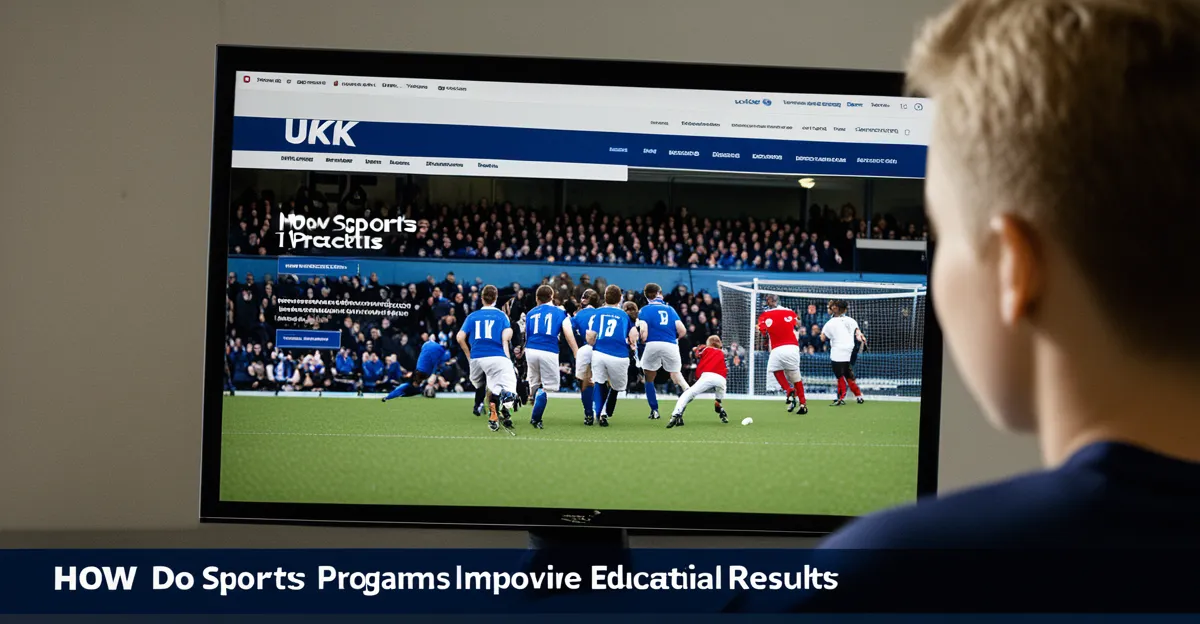Evidence Linking UK Sports Programs to Academic Achievement
Research across the UK consistently shows a positive association between UK sports programs and improved academic outcomes. Several studies reveal that students involved in school sports tend to perform better in standardized tests and exhibit higher overall educational attainment compared to their peers who do not participate.
Official reports from UK education bodies highlight that structured sports programs contribute to enhanced cognitive function, discipline, and time management—all essential for academic success. These benefits are backed by compelling statistics showing that students in sports score higher grades and achieve more consistent progress year over year.
Also to discover : What Are the Economic Benefits of Investing in UK Sports Infrastructure?
A crucial distinction exists between students involved in organized sports and non-participants. Data indicates that those engaged in regular physical activities through school programs show fewer absences and greater classroom focus, directly fostering better academic results. This evidence underscores the importance of investing in well-structured sports initiatives within schools, as participation not only promotes physical health but also significantly boosts academic achievement in measurable ways.
Impact of Sports Participation on Attendance and Engagement
Research shows that participation in sports significantly boosts school attendance across UK schools. Students involved in extracurricular sports activities often feel more motivated to attend regularly. This heightened motivation stems partly from a sense of belonging to a team and the structured routine that sports demand.
Also to discover : How Has UK’s Sports Infrastructure Evolved Over the Decades?
Case studies from various UK schools highlight notable improvements in student engagement following the introduction or enhancement of sports programs. For instance, schools report marked decreases in truancy and increased punctuality when sports are well integrated with school schedules.
Moreover, sports participation positively influences classroom attention and focus. Students who regularly engage in physical activities demonstrate improved concentration during lessons and are less likely to be distracted. The increased energy and discipline gained from sports often translate into better engagement with academic tasks.
In summary, the link between school attendance, student engagement, and participation in sports in UK schools is strong. Sports act as a catalyst for creating motivated, focused learners who consistently attend school and engage actively in their education. This connection reinforces the argument for sustaining and expanding sports programs within educational settings.
Contribution to Personal Development and Social Skills
Participation in UK youth sport plays a crucial role in fostering personal development and enhancing social skills among students. Engagement in structured sports programs cultivates vital competencies like teamwork, leadership, and effective communication. These skills are transferable beyond the playing field, contributing to improved interpersonal interactions both inside and outside school settings.
Studies consistently show that sports encourage collaboration and mutual respect, teaching young people how to work towards common goals while appreciating diverse perspectives. Programs designed with an emphasis on social integration offer safe environments where resilience grows alongside confidence, helping students navigate challenges in academic and personal contexts.
Furthermore, involvement in team sports promotes leadership abilities by providing opportunities to lead peers, make decisions, and resolve conflicts—essential qualities linked to success in later education and employment. The emphasis on cooperation within sports strengthens students’ emotional intelligence, supporting their overall self-esteem and mental wellbeing. This personal growth benefits classroom dynamics, as students equipped with strong social skills tend to contribute positively to learning communities.
In essence, UK sports programs act as a catalyst, sharpening both the individual’s character and social capabilities, which underpin holistic development during formative years.
Wellbeing and Mental Health Benefits
Physical activity within UK sports programs plays a pivotal role in enhancing student wellbeing and mental health. Numerous studies confirm that regular participation in sports reduces stress levels by triggering the release of endorphins, often called “feel-good” hormones. This biochemical effect contributes to improved mood and decreased symptoms of anxiety and depression among students.
Incorporating sports into school routines offers a practical method to support emotional health. UK education initiatives recognize this by introducing targeted programs promoting physical activity alongside mental health education, creating a supportive environment for young people facing psychological challenges.
Longitudinal research highlights that students engaged in consistent sports activities demonstrate greater resilience and lower rates of mental health issues later in life. This is attributed to the combination of physical exertion, social interaction, and structured support inherent in UK sports programs.
Beyond physical benefits, sports participation fosters a sense of achievement and self-worth, both critical components of positive mental health. The emphasis on teamwork and shared goals further enhances emotional connections, reducing feelings of isolation.
In summary, sports and emotional health are deeply interconnected, with UK schools increasingly recognizing the importance of embedding sports to improve student wellbeing holistically.
Integration of Sports Programs with UK Education Curriculum
Schools across the UK increasingly focus on curriculum development that integrates sports programs within the broader educational framework. Embedding physical education into the national curriculum aims to promote a holistic education approach, where physical health complements cognitive learning.
Many UK schools implement cross-curricular activities that connect sports with academic subjects. For example, integrating math by analyzing sports statistics or exploring biology through physical performance enhances understanding across disciplines. These connections make lessons more engaging and relevant, encouraging students to apply theoretical knowledge in practical settings.
Collaboration between schools and local sports clubs or external agencies plays a critical role in this integration. Partnerships help extend resources, expertise, and opportunities beyond traditional classroom boundaries. Such cooperation facilitates specialized training, talent development, and inclusive activities that cater to diverse student needs.
Official guidance from education and sports bodies supports these curriculum strategies, emphasizing that structured sports contribute to personalized student growth and improved educational outcomes. By weaving sports programs into daily school life, UK education fosters environments where physical activity and learning reinforce each other, benefiting students’ academic progress and overall development.
Long-Term Outcomes and Policy Implications
Participation in UK sports programs demonstrates clear links to future success in education and employment. Studies show students engaged in school sports develop critical lifelong skills such as discipline, time management, and teamwork, which enhance employability. These competencies increase the likelihood of pursuing higher education and securing stable careers.
UK policy development increasingly acknowledges these benefits, promoting sustained investment in school sports as a strategy for holistic youth development. Education and health authorities recommend expanding access to quality sports programs, emphasizing inclusion to ensure diverse student participation. This approach supports both physical and personal growth, preparing young people for societal challenges.
Research underscores how early sports involvement correlates with better academic outcomes, higher graduation rates, and improved job prospects later in life. Policies reflect this evidence by integrating sports into broader educational frameworks that foster lifelong skills.
Recommendations include improving funding, facilitating partnerships between schools and sports organizations, and implementing targeted programs for disadvantaged groups. These measures aim not only to enhance student wellbeing but also to create equitable opportunities for success beyond schooling.
In summary, UK policies prioritize sports programs as essential for nurturing skills that contribute directly to long-term educational achievement and workforce readiness.











